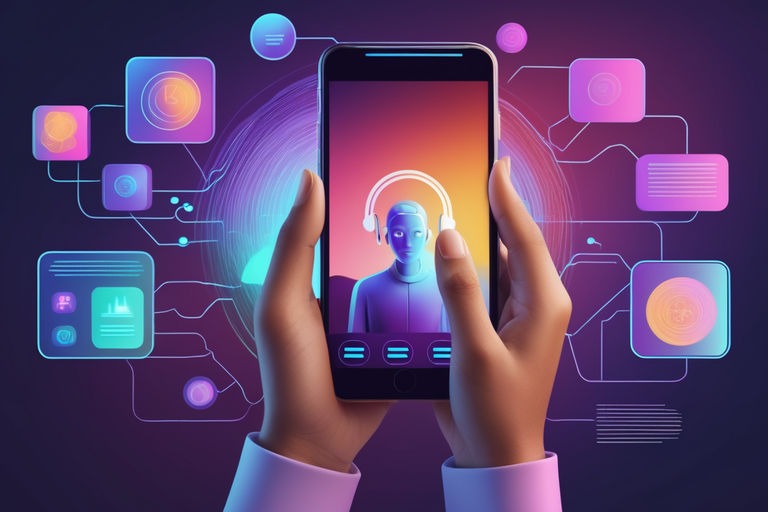Unleash AI Power: Transform User Experiences with Personalized AI Magic
Introduction
In today’s digital age, user experience (UX) is paramount. Personalization, driven by artificial intelligence (AI), is revolutionizing how users interact with digital platforms. This blog post delves into the transformative power of AI in crafting personalized user experiences that captivate and engage.
Understanding AI and Personalization
AI, with its ability to analyze vast amounts of data and learn from it, has made personalization more effective and accurate. By leveraging AI, businesses can offer tailored experiences that cater to individual user preferences, behaviors, and needs.
The Importance of Personalized User Experiences
Personalization enhances user satisfaction, increases engagement, and boosts conversion rates. AI-driven personalization can transform a generic user journey into a unique, memorable experience that keeps users coming back.
How AI Drives Personalization
- Data Collection and Analysis: AI gathers and analyzes user data from various sources, including browsing history, social media interactions, and purchase patterns. This data is then used to create detailed user profiles.
- Behavioral Predictions: AI algorithms predict user behavior based on past interactions. This allows businesses to anticipate user needs and offer timely, relevant content or products.
- Dynamic Content Delivery: AI enables the delivery of dynamic content that changes based on user interactions. This ensures that users always receive content that is most relevant to them.
Practical Applications of AI in Personalization
- E-commerce Personalization: AI personalizes shopping experiences by recommending products based on user preferences and past purchases. For instance, Amazon uses AI to suggest products that users might be interested in, based on their browsing and purchasing history. Revolutionize your web experience with personalized e-commerce solutions.
- Content Personalization: AI-driven content recommendation engines suggest articles, videos, or other media based on user interests. Netflix, for example, uses AI to recommend movies and TV shows tailored to each user’s viewing habits. Master UI/UX design to enhance user engagement with personalized content.
- Customer Support: AI chatbots provide personalized customer support by understanding user queries and delivering customized responses. For example, many companies use AI chatbots to handle common customer inquiries, providing quick and personalized assistance. Transform your mobile app with intelligent AI integration.
- Email Marketing: AI personalizes email marketing campaigns by tailoring content to individual recipients, increasing open rates and conversions. Companies like Mailchimp use AI to personalize email subject lines and content, enhancing engagement and click-through rates.
- Voice Assistants: AI-powered voice assistants offer personalized experiences by learning user preferences and habits over time. Alexa and Google Assistant, for example, can provide personalized recommendations and reminders based on past user interactions. Unlock the future with voice search optimization.
AI Personalization in Different Industries
- Healthcare: AI personalizes healthcare by providing tailored treatment plans based on individual patient data. For example, IBM Watson Health uses AI to analyze patient data and recommend personalized treatment options.
- Education: AI personalizes education by offering customized learning experiences. Platforms like Coursera use AI to recommend courses based on user interests and previous learning history.
- Finance: AI personalizes financial services by providing tailored investment advice. Robo-advisors like Betterment use AI to create personalized investment portfolios based on user goals and risk tolerance.
Challenges and Considerations
While AI offers immense potential for personalization, there are challenges to consider:
- Privacy Concerns: Users are increasingly concerned about data privacy. Businesses must ensure transparency and compliance with data protection regulations. Implementing clear privacy policies and obtaining user consent for data collection are crucial steps.
- Algorithm Bias: AI algorithms can inadvertently perpetuate biases present in training data. It is crucial to regularly review and update AI models to mitigate bias. Implementing fairness checks and diverse training data can help address this issue.
- Implementation Costs: Implementing AI solutions can be costly. However, the long-term benefits of enhanced user experience often justify the investment. Businesses should weigh the initial costs against the potential for increased user engagement and revenue.
Future Trends in AI Personalization
The future of AI in personalization looks promising, with advancements in machine learning, natural language processing, and predictive analytics. As AI technology continues to evolve, we can expect even more sophisticated and effective personalization strategies.
- Hyper-Personalization: Hyper-personalization uses real-time data to provide even more precise and tailored experiences. This approach goes beyond traditional personalization by considering context, such as the user’s current location and time of day.
- AI-Driven Personalization in AR/VR: Augmented Reality (AR) and Virtual Reality (VR) are poised to offer highly personalized experiences. For instance, AI can tailor AR/VR content based on user interactions and preferences, creating immersive and engaging environments.
- Personalization in IoT: The Internet of Things (IoT) will enable even more personalized experiences as devices become more interconnected. AI can analyze data from various IoT devices to provide a seamless and personalized user experience across different platforms.
Conclusion
Leveraging AI for personalized user experiences is no longer a luxury but a necessity. By understanding user preferences and delivering tailored experiences, businesses can significantly enhance user satisfaction and engagement. Embrace the power of AI and transform your digital interactions today.
Discover more from Just-CO
Subscribe to get the latest posts sent to your email.




